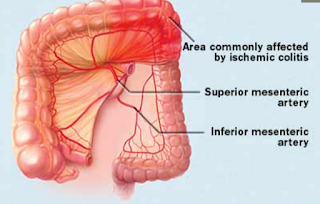Ischemic colitis
Ischemic colitis occurs when blood flow to part of the large intestine (colon) is reduced, usually due to narrowed or blocked blood vessels (arteries). The diminished blood flow doesn't provide enough oxygen for the cells in your digestive system.
Ischemic colitis can cause pain and may damage your colon. Any part of the colon can be affected, but ischemic colitis usually causes pain on the left side of the belly area (abdomen).
The condition can be misdiagnosed because it can easily be confused with other digestive problems. Ischemic colitis may heal on its own. But you may need medication to treat ischemic colitis or prevent infection, or you may need surgery if your colon has been damaged.
Symptoms
Signs and symptoms of ischemic colitis can include:
- Pain, tenderness or cramping in your belly, which can occur suddenly or gradually
- Bright red or maroon-colored blood in your stool or, at times, passage of blood alone without stool
- A feeling of urgency to move your bowels
- Diarrhea
- Nausea
The risk of severe complications is higher when you have symptoms on the right side of your abdomen. That's because the arteries that feed the right side of your colon also feed part of your small intestine, and may be blocked too. Pain tends to be more severe with this type of ischemic colitis.
Blocked blood flow to the small intestine can quickly lead to death of intestinal tissue (necrosis). If this life-threatening situation occurs, you'll need surgery to clear the blockage and to remove the portion of the intestine that has been damaged.
Causes
The precise cause of diminished blood flow to the colon isn't always clear. But several factors can increase your risk of ischemic colitis:
- Buildup of fatty deposits on the walls of an artery (atherosclerosis)
- Dangerously low blood pressure (hypotension) associated with heart failure, major surgery, trauma or shock
- A blood clot in an artery supplying the colon or, less commonly, in a vein (venous thrombosis)
- Bowel obstruction caused by a hernia, scar tissue or a tumor
- Surgery involving the heart or blood vessels, or the digestive or gynecological systems
- Other medical disorders that affect your blood, such as inflammation of the blood vessels (vasculitis), lupus or sickle cell anemia
- Cocaine or methamphetamine use
- Colon cancer (rare)
Risk factors
Risk factors for ischemic colitis include:
- Age. The condition occurs mostly frequently in adults older than age 60. Ischemic colitis that occurs in a young adult may be a sign of a blood-clotting abnormality or inflammation of the blood vessels (vasculitis).
- Clotting abnormalities. Conditions that affect the way the blood clots, such as Factor V Leiden, may increase the risk of ischemic colitis.
- High cholesterol, which can lead to atherosclerosis.
- Reduced blood flow, due to heart failure, low blood pressure and shock.
- Previous abdominal surgery. Scar tissue that forms after surgery may cause reduced blood flow.
- Heavy exercise, such as marathon running, which can lead to reduced blood flow to the colon.
- Surgery involving the large artery (aorta) that pumps blood from your heart to the rest of your body.
Complications
Ischemic colitis usually gets better on its own within two to three days. In more-severe cases, complications can include:
- Tissue death (gangrene) resulting from diminished blood flow
- Hole (perforation) in your intestine or persistent bleeding
- Bowel inflammation (segmented ulcerating colitis)
- Bowel obstruction (ischemic stricture)



Comments